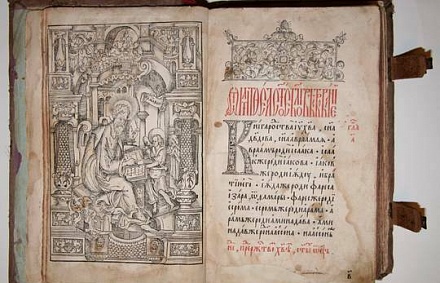
Theophylact Bulgarian. Interpretation of the Gospel of Matthew
Matthew 20: 1. For the kingdom of heaven is like a master of a house who went out early in the morning to hire laborers for his vineyard.
Matthew 20: 2. and having agreed with the laborers on a denarius for the day, he sent them into his vineyard;
Matthew 20: 3. leaving about three o'clock, he saw others standing idle in the marketplace,
Matthew 20: 4. And he said to them: Go you also into my vineyard, and what will follow, I will give you. They went.
Matthew 20: 5. He went out again at about the sixth and ninth hour, and did the same.
Matthew 20: 6. Finally, going out about eleven o'clock, he found others standing idle, and said to them: why are you standing idle here all day?
Matthew 20: 7. They tell him: no one hired us. He says to them: Go you also into my vineyard, and what you will follow, you will get.
The Kingdom of Heaven is Christ. He becomes like a man, because he has taken our image. He is a householder, as he dominates the house, that is, the church. This Christ came from the bosom of the Father and hires workers in the vineyard, that is, to study the Scriptures and fulfill the commandments contained there. You can also understand this: He hires every person to cultivate the vineyard, that is, to perfect his own soul in good. He hires one in the morning, that is, in childhood, the other - about the third hour, that is, in adolescence, another about the sixth and ninth hour, in the twenty-fifth or thirtieth year, in general, in the male age, and about the eleventh hour - of the elders, for many believed when they were already elders. Or in other words: by day we mean the real century, for during it we work as during the day. In the first hour of the day, the Lord called Enoch, Noah and their contemporaries, in the third - Abraham, in the sixth - Moses and those who lived with him, in the ninth - the prophets, and in the eleventh, at the end of the centuries, - the pagans who did not have a single good deed: 'no one hired them,' that is, not a single prophet was sent to the Gentiles.
Matthew 20: 8. When evening came, the lord of the vineyard says to his steward: Call the workers and give them the wages, starting from the last to the first.
Matthew 20: 9. And those who came about the eleventh hour received a denarius.
Matthew 20:10. Those who came first thought that they would receive more, but they also received a denarius;
Matthew 20:11. and, having received, began to murmur against the owner of the house
Matthew 20:12. and they said: these last worked for one hour, and you made them equal to us, who endured the hardships of the day and the heat.
Matthew 20:13. He answered and said to one of them: friend! I do not offend you; Did you not agree with me for a denarius?
Matthew 20:14. take yours and go; I want to give the latter is the same as you;
Matthew 20:15. do I not have the power to do what I want in mine? or is your eye envious because I am good?
Matthew 20:16. So the last will be the first and the first will be the last; for many are called, but few are chosen.
Evening is the end of the century; at death all receive a denarius; denarius is the grace of the Holy Spirit, which transforms a person in the image of God, makes him a partaker of the Divine nature. Those who lived before the coming of Christ suffered more labor, since then death was not yet destroyed, the devil was not crushed, and sin was alive. But we, having been justified in baptism by the grace of Christ, receive the power to overcome our enemy, who had already been deposed and put to death by Christ. According to the first interpretation, those who believed in their youth carry more work than those who came to Christ in old age. The young man endures the 'burden' of anger and the heat of lust, and the old man is calm from this. However, all are worthy of the same gift of the Holy Spirit. The parable teaches us that it is possible in old age through repentance to receive the Kingdom of Heaven, for old age is indicated by the eleventh hour. But, according to the parable, would not the saints be jealous of those who received their equal rewards? No way. It shows only that the blessings prepared for the righteous are so abundant and high that they could arouse envy.





